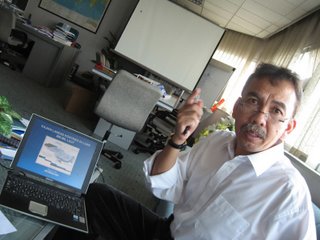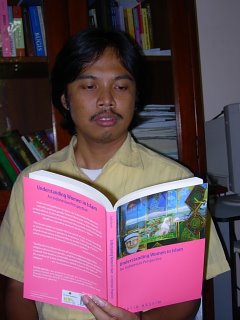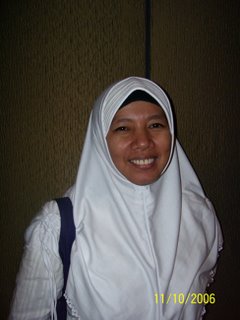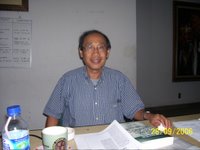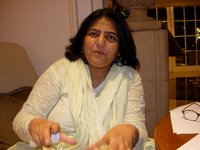 First published in The Jakarta Post, December 8, 2006
First published in The Jakarta Post, December 8, 2006ADRIANUS MELIALA: PUSHING FOR REFORM OF INDONESIAN POLICE
Alpha Amirrachman, Contributor, Jakarta
Asked about the progress of police reform in Indonesia, criminologist and police analyst Adrianus Eliasta Sembiring Meliala said that it was obvious, but the direct benefit for citizens would not be realized in one night.
"This is because police reform takes place in three interrelated and complex domains: structural, instrumental and cultural. Policing activities have not been practically touched by the reform," said Adrianus during an interview with The Jakarta Post at the Institute of Police Science (PTIK), where he teaches as a part time lecturer.
"Structurally, we have tried to position the police away from the military. The police are now under the President, no longer the military. But this is a compromise, not the ideal position," he said.
He explained that, ideally, the police should be under a political or ministerial institution, "because there should be a manager to whom the police would be accountable. Currently
He added, however, that this was still better than before, when the police were under the military.
He explained that in the curriculum, all militaristic approaches have been scrapped. For example, the military shooting style has been replaced by one for the police.
"In the military, you get the highest score if you can shoot the head of the enemy, but under police shooting style you'll get the highest score for the feet. In the police you shoot to cripple, not to kill," he argued.
In recruiting new members, a new approach has also been adopted. "We are not looking for cold, hard personalities as in the military, but socially helpful personalities with an honest and warm attitude."
A new work culture has also been introduced, "Ten years ago you would need to undergo massive security check just to enter this police education complex, but not now, right?" he said.
The new recruitment approach with psychological testing was introduced earlier this year, meaning there were all together around 8,000 new students from two semesters of recruitment by the State Police School (SPN). The curriculum was also introduced just four years ago.
"We predict that by 2011 all new approaches with a new generation of personalities will be fully in place," said Adrianus, who has just been awarded a professorship in criminology from the
His speech during his professorship inauguration was titled State Crimes: Some Lessons from
He said he chose the topic because attention has been given too much to personal and individual crimes, while state crimes tend to be overlooked.
"The political legitimacy of the state doesn't prevent the state from committing crimes. Often, people don't realize that they have become victims of state crimes because of the state's political legitimacy," he said, warning of the danger of state crimes.
Asked if the murder of human rights activist Munir was an example of a state crime, he said: "In Munir's case, the state committed two crimes: first the failure of the state to protect its citizens; second, its failure to resolve the case thoroughly."
He added that the tragedy also clearly indicated a flaw in the work performance of the police.
Born Sept. 28, 1966, Adrianus was only in the third year of elementary school when his father, a career attorney, passed away, leaving behind a wife and three young children.
"My mother vowed to raise her children alone; she refused to remarry," said Adrianus, the eldest in the family.
"But life was hard; many members of our family left us alone to struggle for a new life. Many regarded us as liability, so my mother declared that it was our own responsibility to raise up our family's social status, and only through education could we can pursue that."
Adrianus spent his time from kindergarten to senior high school at a Catholic-oriented Bunda Hati Kudus education institution.
"My mother was so preoccupied with selling food in our neighborhood to earn a living, she entrusted her children's education to this disciplined, tough Catholic education institution," he said, adding that he invited his former teachers to his professorship inauguration.
He also opted, pragmatically, to study criminology at the
Nevertheless, it turned out that he made the right decision and that he fell in love further with the subject he had chosen.
He received his Masters in Social Psychology from the University of Indonesia in 1994 with a thesis titled Judgmental Factors on Corruption as Behavior, and in Legal and Criminological Psychology from Manchester Metropolitan University, the UK, in 1995 with thesis titled Anxieties Having Students in Manchester (sic), and a PhD in Criminology from the University of Queensland, Australia, in 2004 with thesis titled Sensitive Policing: Indonesia's Case.
Adrianus, who once also worked as a journalist at Editor news magazine for two and a half years, teaches at various institutions.
These include the
He also served as an expert advisor to the Indonesian Police chief from 2001 to 2006.
A prolific writer, Adrianus has produced 12 books that he either wrote or edited, and numerous scholarly articles in both national and international journals, including popular pieces in the national media.
Adrianus is married to Maria Regina Rosari Br. Ginting. They have four children, three of which have survived.
He said that people need to be patient on law enforcement, "Because the police often need to consider social justice, not just legal justice."
He gave as an example the case of domestic violence. "The police need to consider fully many factors before taking legal action because of the social impact that could spill over onto the children and other members of the family.
"That is why nonlegal settlement is usually offered as the fist option when the police are faced with such cases. But the police will often then be accused of acting partially -- of putting aside legal justice."
Nonetheless, when cases move up to the attorney office, usually legal consideration is fully held, "and people will complain of the lack of social justice," he said of the acute dilemma.
He also said that street justice, which sees petty criminals beaten to death, is not merely caused by the lack of trust of people toward law enforcement, "It relates to wider, nonlegal issues, such as the dynamics of the development of urban societies, in which police still lack the knowledge and skills to deal with often fast-changing societal behavior."
Asked about the biggest obstacle to police reform in
He cited an example that the police have tried some of their high-ranking officers such as three-star generals Suwitno Landung and Ismuko over alleged corruption; conversely, not even a one-star general in the military has been tried.
"Look at the alleged corruption over the transformation of Kostrad and the case of the late Brigadier General Koesmayadi, who allegedly collected a large amount of weapons. These cases were swept under the carpet, discouraging the police to undergo further reform."


